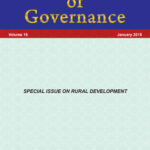Management of water resources strongly influences domains that are critical for overall human development, including health, agriculture, environment, energy, spatial planning, regional development and poverty alleviation. Ambitious goals of doubling the income of farmers in next five years, eradicating open defecation by building more toilets, scientific management of municipal solid waste, wastewater and industrial pollution management for cleaner water bodies, and building of smart cities, has set the bar for water management very high. Growing complexity of water management in India due to limiting natural resources, demographic changes and potential climate change pose increasingly complex challenges to overall sustainable development in the country.
Widespread water shortages and deteriorating water quality in many parts of the country are already impacting food productivity, health and well-being. Many water bodies, including ground water aquifers, suffer severe water quality impairments affecting drinking water vulnerability. Due to unregulated withdrawals, groundwater levels are depleting. Deterioration of surface and groundwater quality due to river pollution, over exploitation, excessive use of fertilizers, pesticides etc. has exposed drinking water sources to the risk of arsenic, fluoride and other contamination due to anthropogenic activities. Large and medium cities often get deluged by contaminated drainage waters even with rainfall of little intensity.


